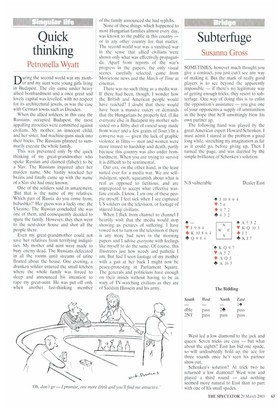Quick thinking
Petronella Wyatt
During the second world war my mother and my aunt were young girls living in Budapest. The city came under heavy allied bombardment and a once great and lovely capital was levelled, with no respect for its architectural jewels, as was the case with German towns such as Dresden.
When the allied soldiers, in this case the Russians. occupied Budapest, the most appalling atrocities were committed against civilians. My mother, an innocent child, and her sister, had machine-guns stuck into their backs. The Russians planned to summarily execute the whole family.
This was prevented only by the quick thinking of my great-grandmother who spoke Russian and claimed (falsely) to be a Slay. The Russians inquired after her maiden name. She hastily wracked her brains and finally came up with the name of a Slav she had once known.
One of the soldiers said in amazement, But that is the name of my relatives. Which part of Russia do you come from, babushka?' Her guess was a lucky one: the Ukraine. The Russian concluded she was one of them, and consequently decided to spare the family. However, they then went to the next-door house and shot all the people there.
Even my great-grandmother could not save her relatives from terrifying indignities. My mother and aunt were made to bury enemy dead. The Russians defecated in all the rooms until streams of urine floated about the house. One evening, a drunken soldier entered the small kitchen where the whole family was forced to sleep and announced his intention to rape my great-aunt. He was put off only when another fast-thinking member of the family announced she had syphilis.
None of these things, which happened to most Hungarian families almost every day. was known to the public in this country — or in any other country for that matter. The second world war was a sanitised war in the sense that allied civilians were shown only what was effectively propaganda. Apart from reports of the war's progress in the papers, the only visual scenes, carefully selected, came from Movietone news and the March of Time at cinemas.
There was no such thing as a media war. If there had been, though, I wonder how the British and American people would have reacted? I doubt that there would have been a massive outcry or demands that the Hungarians be properly fed. (Like everyone else in Budapest my mother subsisted on a filthy diet of rancid soup made from water and a few grains of flour.) In a converse way — given the lack of graphic violence in films — men and women were more inured to hardship and death, partly because this country was also under bombardment. When you are trying to survive it is difficult to be sentimental.
Our era, on the other hand, is the least suited ever for a media war. We are selfindulgent, spoilt, squeamish about what is real as opposed to fictitious, and are unprepared to accept what effective warfare entails. I know. I am one of these people myself. I feel sick when I see captured US soldiers on the television, or footage of injured Iraqi civilians.
When I flick from channel to channel I heartily wish that the media would stop showing us pictures of suffering. I have vowed not to turn on the television if there is any more had news in the morning papers and I advise everyone with feelings like myself to do the same. Of course, this illustrates just how weedy and pathetic I am. But had I seen footage of my mother with a gun at her back I might now be peace-protesting in Parliament Square. The generals and politicians have enough on their minds without having to be as wary of TV-watching civilians as they are of Saddam Hussein and his army.








































































 Previous page
Previous page